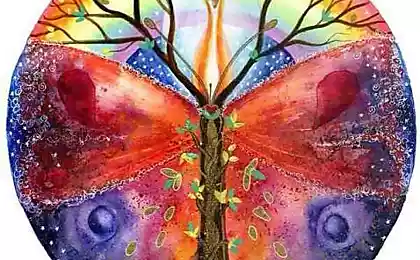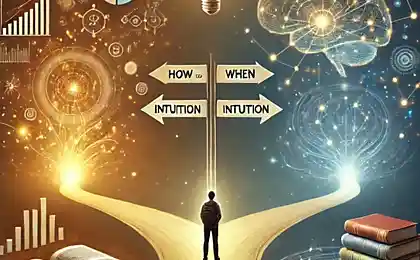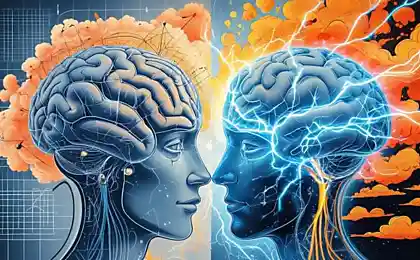322
How to distinguish intuition from anxiety when making important decisions

Each of us at least once in our lives faced a choice that could change everything. A new job, an important move, the beginning or end of a relationship – at such moments, the inner voice whispers clues, but how do you know whether it is intuition leading to the right path, or anxiety, shackling fear? To understand this is to master the art of decision-making and to understand yourself more deeply. In this article, we explore the nature of these two senses, learn to distinguish them and find practical ways to use them to your advantage.
Intuition: The Quiet Voice of Experience
Intuition is neither magic nor supernatural sense. This is the ability of our brain to process information quickly, based on accumulated experience, knowledge and subconscious signals. Scientists such as psychologist Gerd Gigerenzer call it the “intelligence of the unconscious.” It comes as a calm, confident feeling that requires no proof but feels right.
Imagine you're in an interview. Everything is going smoothly, but something tells you that this company is not your place. You can’t explain why, but that feeling stays with you. It is an intuition that may have picked up subtle inconsistencies in words or atmosphere that are inaccessible to your conscious analysis.
Anxiety: The Guardian Who Sometimes Makes Wrong
Anxiety is a different story altogether. It's an emotional response rooted in our biology. It is activated in the amygdala when we face uncertainty or a potential threat. Its purpose is to protect us, but in today’s world, it often works out of place. A rapid heartbeat, tension in the chest, an endless flow of "what if" - these are its companions.
For example, before an important talk, you may feel your palms sweating and your thoughts confused. It's anxiety that paints the worst-case scenarios, even if you're well prepared. Unlike intuition, it is loud, intrusive and often interferes with clarity.
Key differences: how to recognize?
Intuition and anxiety may seem similar, especially in stressful moments, but they have distinct differences. Let's take them apart.
- Body sensations: Intuition is calmness and ease, even if the decision is difficult. Anxiety is physical discomfort, tension, or anxiety.
- Speed and stability: Intuition comes quickly and remains stable. Anxiety can increase, fluctuate or disappear under the influence of external factors.
- Source: Intuition is an inner knowledge that requires no explanation. Anxiety feeds on fears, doubts, and concrete “suddenly.”

Practical life hacks: how to learn to distinguish
Now that we understand the difference, it’s time to take action. Here are some proven ways to develop this skill and make good decisions.
Breathe and listen: Take a few deep breaths to calm your body. Anxiety will subside, and intuition will be heard.
Ask the body a question: Ask yourself, “How do I feel about this decision?” Lightness and warmth are intuition. Heaviness and cold are anxiety.
Check it out. Give yourself a day or two. If the feeling remains constant and calm, it is intuition. If it gets worse or worse, worry.
Write down your thoughts: Keeping a diary helps to separate chaotic fears of anxiety from clear signals of intuition.
Trust, but check: If your intuition tells you something unexpected, look for small confirmations of reality to build confidence.
These techniques are simple but effective. They help not only to distinguish between feelings, but also to develop awareness, which is useful in all areas of life.
Stories that inspire
To reinforce our understanding, let us turn to real examples.
When intuition saves: Anna, a 32-year-old designer, received a lucrative job offer abroad. Everything looked perfect, but something inside said no. She decided to trust that feeling and refused. It was later revealed that the company went bankrupt three months later. Intuition caught what reason did not see.
When the anxiety subsides: Sergey dreamed of opening a coffee shop, but the fear of failure paralyzed him for years. He began practicing breathing techniques and recording his thoughts. Over time, he realized that anxiety painted imaginary obstacles, and his intuition quietly said, “You can do it.” Today, his coffee shop is a favorite place in the area.
These stories show that listening to yourself is not an innate gift, but a skill that can be developed.

Why does it matter?
Life is a series of choices, and how we make them determines our happiness and success. Intuition is our internal navigator that helps us move forward even when there is no map. Anxiety is an alarm that sometimes goes too loud. Learning to distinguish between them will not only improve your decisions, but also gain inner confidence.
Research shows that people who rely on intuition combined with analysis are more likely to succeed in the long run. So it’s not just self-discovery, it’s an investment in your future.
Glossary
Intuition: The ability to understand or anticipate something without explicit logical reasoning, based on experience and subconsciousness.
Alarm: An emotional state caused by uncertainty or fear, often accompanied by physical symptoms.
Mindfulness: A state of complete presence and attention to one’s thoughts, feelings and the world around them.
Self-knowledge: The process of studying and understanding one’s own emotions, motives, and reactions.
8 Habits That Make Your Memory Worse
Keanna Louise Stephens: Model, Influencer and Creator of Modernity























